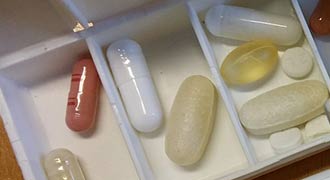Each year one and a half million people are affected by medication errors, and of those affected, an astonishing 100,000 people die as a result. If you have a loved one in a nursing home who has fallen ill or died due to a medication error, do not hesitate to contact a nursing home abuse lawyer who can file a suit against the nursing home on your behalf. We charge no legal fees until you secure the award or settlement you are entitled to. Feel free to call or contact us online at any time, to schedule a free (no-obligation) case evaluation.

Do You Believe Your Loved One Suffered from Medication Errors?
Call d’Oliveira & Associates for a Free Case Evaluation!
How Do Medication Errors in Nursing Homes Happen?
 Medications in nursing homes are usually distributed through what is known as the “med pass.” Med pass is the process of filling a cart with each patient’s medications and visiting each patient in a facility over the course of several hours. Due to the length of med pass and how many different patients’ medications are in the cart, many medication errors occur.
Medications in nursing homes are usually distributed through what is known as the “med pass.” Med pass is the process of filling a cart with each patient’s medications and visiting each patient in a facility over the course of several hours. Due to the length of med pass and how many different patients’ medications are in the cart, many medication errors occur.
What Causes Staffs to Be Neglectful?
It is easy for nursing home staffs to become busy and distracted during the med pass process. North Carolina, which records every medication error made in each nursing home in the state, has identified three major causes of medication errors.
-
- Communication Errors: mistakes made when identifying patients who are on a drug with those who would injured by a drug, typically associated with the blood-thinning drug Warfarin.
-
- Transcription Errors: errors made when typing or copying notes made on a patient’s chart, usually associated with the antacid Nexium (esomeprazole), the antipsychotic Risperidal (rispiridone), and the antibiotic Nitrofuratonin.
- Name Confusion: since medications can have complicated or similar names, confusing one medication with another.
How Can Medication Errors Be Prevented?
While it is hard to eliminate human error from this process, there are some steps you can take as a patient to ensure that you are getting the proper medication. For example, ask your doctor to describe to you the medication you are being prescribed and do some research online so you are aware of the name and how it is supposed to be administered. Also, be sure to inform your doctor of any other meds you may be on, allergies, or any other pre-existing medical conditions you may have, so the doctor can make the most informed decision about a medication they are putting you on. Finally, as a nursing home resident, don’t be afraid to ask questions to whomever may be administering your medications as this will cause them to double check and diminish the chances of a medication error.
Types of Medication Errors in Nursing Homes
 There are four types of medication errors that commonly occur in nursing homes.
There are four types of medication errors that commonly occur in nursing homes.
-
- Missed Dose: When a patient fails to receive the medication that was prescribed by their doctor or other medical professional.
-
- Overdose/Underdose: When a patient receives a markedly smaller or larger amount of a drug than they were supposed to.
-
- Wrong Strength /Patient: The proper drug is either administered to the wrong patient, or is administered with pills of the wrong amount (for example, a 10mg pill rather than a 5mg pill).
- Wrong Product: When the patient receives the wrong medication due to confusion as to which drug was intended for that patient, or a wrongly filled prescription and the failure of the administering nurse to correct the error.
What are Some Examples of Medication Errors in Nursing Homes?
 Some errors are more common than others, especially in the use of medications that are prescribed most often. Here are some examples and illustration of medication errors.
Some errors are more common than others, especially in the use of medications that are prescribed most often. Here are some examples and illustration of medication errors.
-
- Patient Allergy: A patient is given a medication to which they have previously displayed an allergy.
-
- Insulin: Among elderly diabetic patients, the wrong dosage of insulin can be fatal. One patient accidently received ten times the regular dose of insulin when “20 U” – meaning 20 units – was mistaken to mean “200” units.
-
- Arthritis Medication: Certain medication for rheumatoid arthritis is also used in much higher doses as a cancer treatment. Receiving the wrong dose can be fatal.
- Warfarin & Blood Thinners: Many elderly patients are on blood thinners. If a medication error results in the wrong patient receiving blood thinners and anticoagulant medications, deadly internal bleeding can result.
Call Us For Help Today!
 If you or a loved one has suffered injuries as a result of medication errors in a nursing home or assisted living facility, do not hesitate to contact an experienced lawyer to help you understand your legal rights. We are working with some of the most experienced nursing home abuse lawyers in the state, who fight for injured peoples’ rights daily and charge no legal fee unless you secure the settlement or award you deserve. Feel free to call us anytime at 1-800-992-6878 or fill out a contact form online, for a free (no-obligation) case consultation.
If you or a loved one has suffered injuries as a result of medication errors in a nursing home or assisted living facility, do not hesitate to contact an experienced lawyer to help you understand your legal rights. We are working with some of the most experienced nursing home abuse lawyers in the state, who fight for injured peoples’ rights daily and charge no legal fee unless you secure the settlement or award you deserve. Feel free to call us anytime at 1-800-992-6878 or fill out a contact form online, for a free (no-obligation) case consultation.
